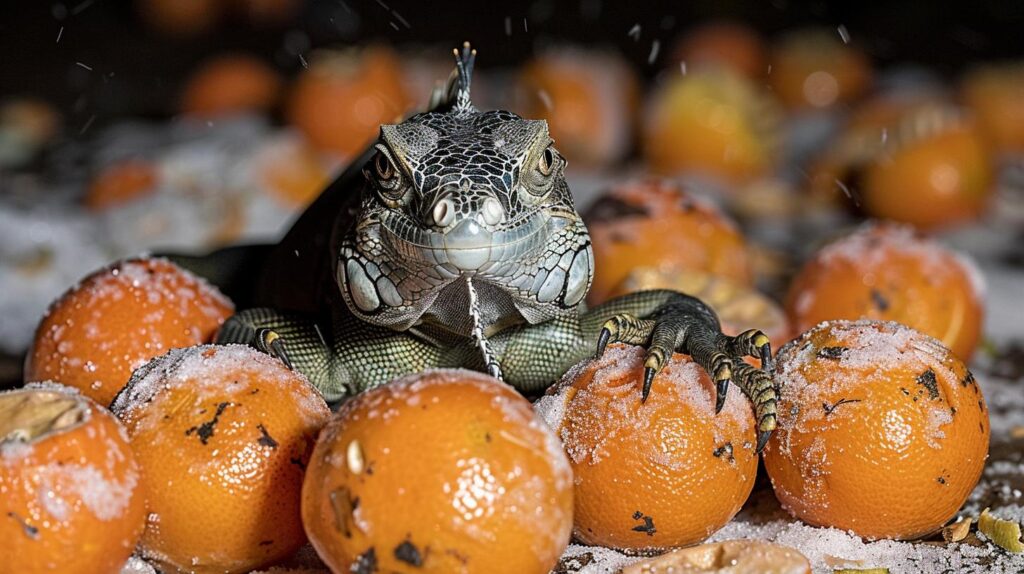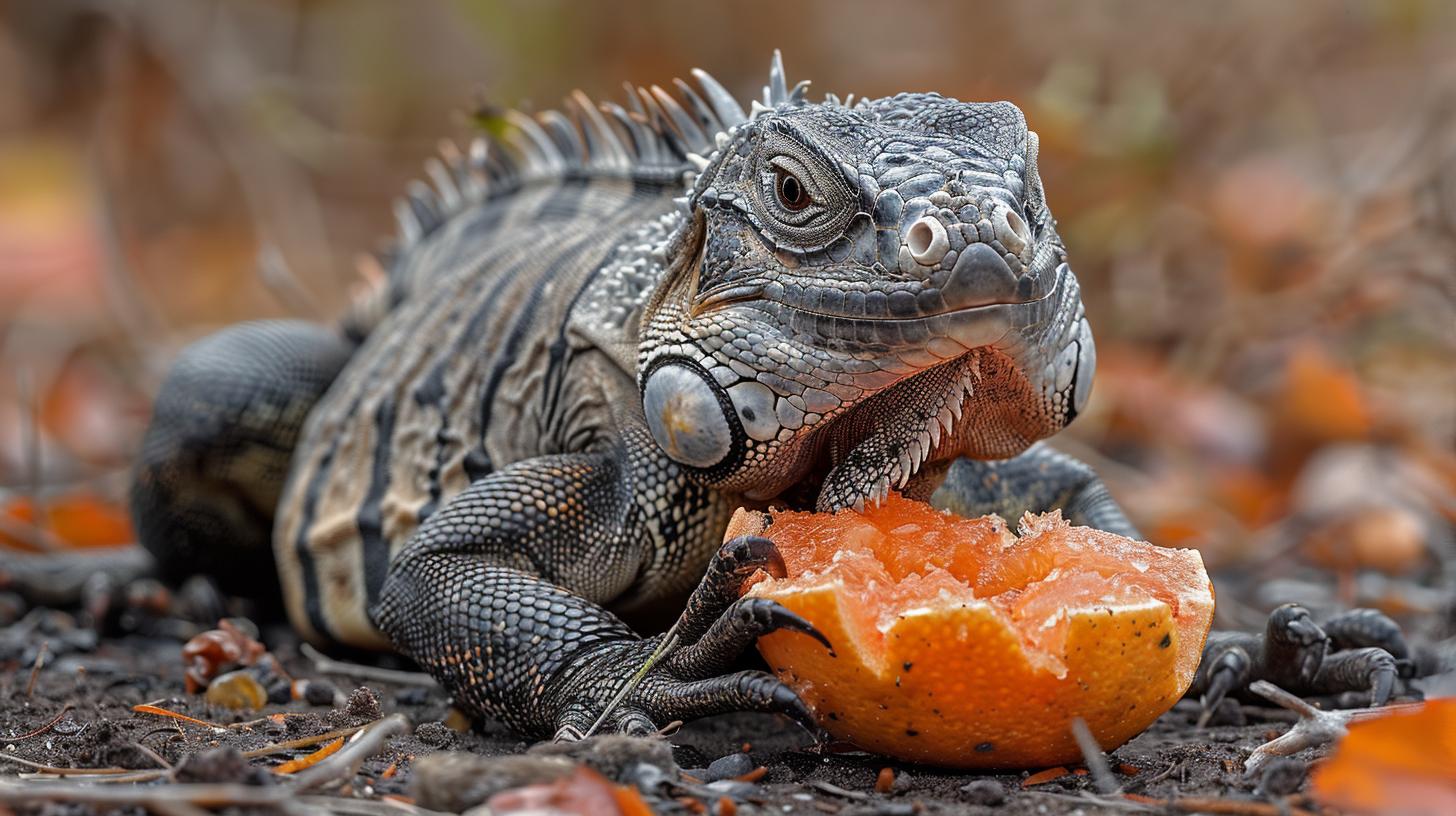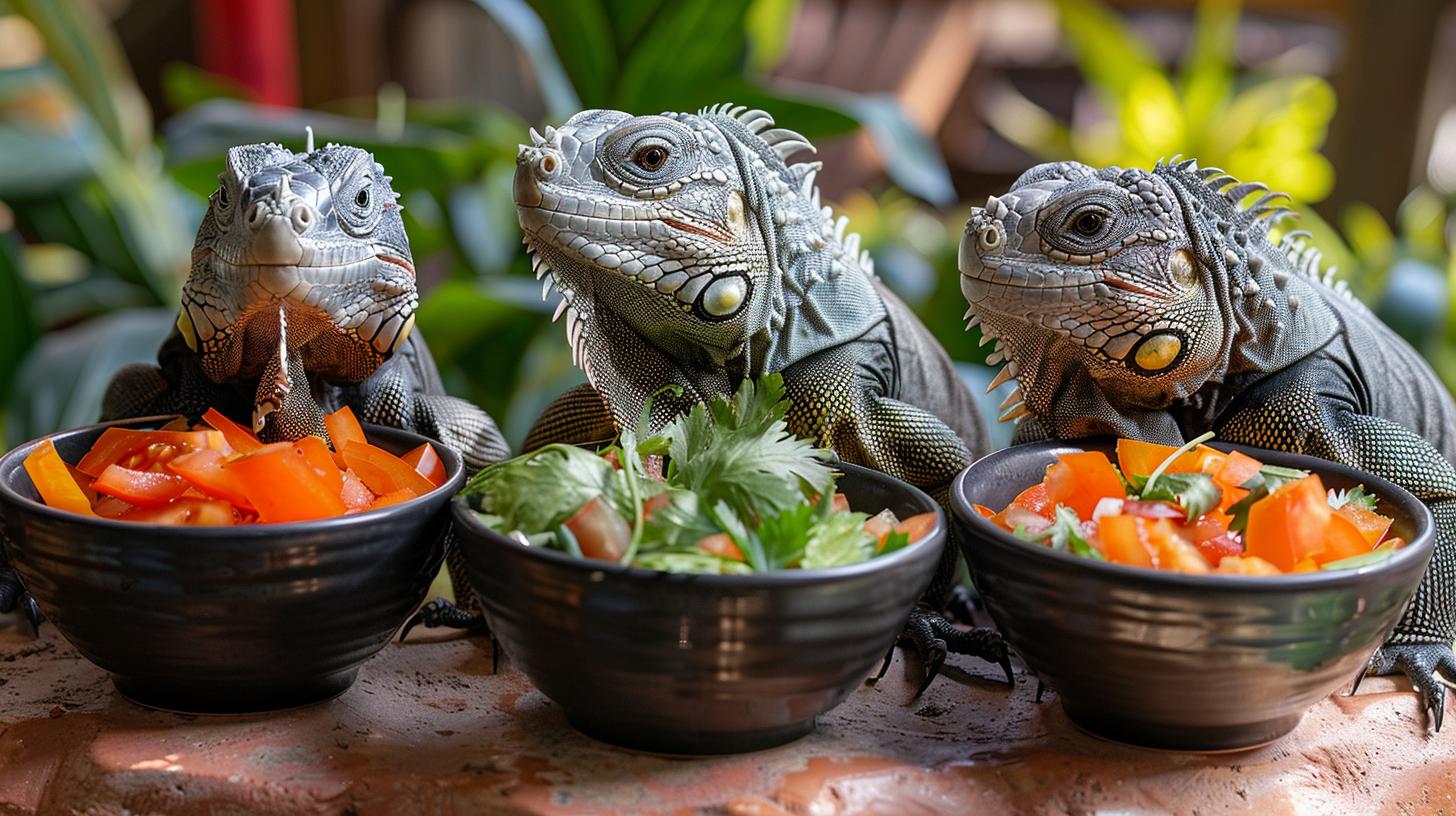What Can Iguanas Safely Eat? Uncover Healthy Choices

Navigating the World of Iguana Nutrition
When it comes to ensuring the health and longevity of your pet iguana, understanding the intricacies of safe iguana foods is paramount. Iguanas have specific dietary needs that, when met, contribute significantly to their overall well-being.
Given these unique requirements, diving into the world of iguana nutrition not only unveils what is best for your scaly friend but also highlights the importance of a balanced diet tailored to their needs. This balance is crucial, as it directly influences their health, vitality, and even behavior.
The cornerstone of proper iguana care lies in grasping the comprehensive anatomy and physiology that dictates their dietary needs. These creatures thrive on a diet predominantly composed of vegetables but require careful selection to maintain an optimal balance between calcium and phosphorus - a ratio essential for preventing bone disease.
Additionally, vitamin D3 plays a critical role in calcium absorption; a lack thereof can lead to significant health issues for your reptilian companion. Understanding these fundamentals paves the way for creating a meal plan that supports vibrant health.
Within this framework of nutritional necessities lies a varied palette of vegetables and fruits deemed safe for iguanas. A diet rich in dark leafy greens offers an excellent foundation, while the inclusion of squash and peas diversifies their nutrient intake, contributing to overall health.
On occasion, treats such as mango and papaya can add excitement to their meals without compromising nutritional value. However, discerning which foods align with these requirements-and those that pose risks-is key to nurturing a thriving iguana.
A Deep Dive Into Iguana Dietary Needs
Understanding the intricate details of an iguana's dietary needs isn't just about keeping them alive; it's about allowing them to thrive. These captivating reptiles boast a unique anatomy and physiology that necessitates a specific diet to maintain their health and vitality.
Their well-being hinges on a delicate balance of nutrients, with a particular emphasis on achieving the right ratio of calcium to phosphorus and ensuring adequate levels of Vitamin D3 for optimal calcium absorption. This knowledge is crucial for iguana owners who aim to provide their pets with not only a survivable environment but one where they can flourish.
Calcium, Phosphorus, and Vitamin D3: The Triad of Iguana Nutrition
The significance of a diet high in calcium and low in phosphorus cannot be overstated when it comes to iguana health. Their bodies require substantial amounts of calcium for strong bone formation, yet without proper management, phosphorus can bind with calcium, making it unavailable to the animal. This imbalance can lead to critical health issues, such as metabolic bone disease-an unfortunately common affliction in captive iguanas that results from nutritional deficiencies.
Furthermore, Vitamin D3 plays a pivotal role in this nutritional ballet by enhancing the body's ability to absorb and utilize calcium efficiently. Unlike humans who can synthesize Vitamin D with sufficient sunlight exposure, iguanas often rely on their diet or supplements to meet these needs, underscoring the importance of dietary management.
Harnessing Safe Iguana Foods for Nutritional Balance
Venturing into the realm of safe iguana foods opens up various avenues through which pet owners can enrich their iguana's diet while ensuring they're meeting these critical nutritional requirements. A foundation built upon dark leafy greens not only supplies hefty doses of calcium but also serves as a staple that mimics their natural feeding habits in the wild.
Incorporating vegetables like squash and pods like peas further diversifies their intake, offering an array of vitamins and minerals conducive to overall health. On occasion, fruits such as mangoes and papayas can be introduced as treats, bringing vibrant flavors into their routine without compromising their nutritional balance.
Grasping these dietary essentials empowers iguana owners to curate meal plans that not only avoid harm but actively contribute to their pet's vitality and longevity. As we journey deeper into understanding safe iguana nutrition, remember that variety is more than the spice of life-it's a foundational pillar for thriving exotic pets.
Safe Iguana Foods
When it comes to maintaining your iguana's health and vitality, understanding the safe iguana foods that should dominate their diet is crucial. Iguanas are primarily herbivorous creatures, thriving on a rich variety of vegetables and fruits. These not only provide them with necessary nutrients but also help replicate their natural diet in the wild. Let's delve into the essentials that should make up the cornerstone of their meals.
Firstly, dark leafy greens should form the bulk of your iguana's vegetable intake. These are not just safe but highly beneficial due to their high calcium content, which is essential for preventing metabolic bone disease - a common ailment in captive iguanas. Safe vegetables include:
- Collard greens
- Mustard greens
- Dandelion leaves
- Watercress
Besides these leafy staples, incorporating a range of other vegetables can add variety and additional nutrients to your iguana's diet. Vegetables such as *butternut squash*, zucchini, and *peas* offer different textures and tastes while ensuring your pet receives a spectrum of vitamins and minerals. It's recommended to lightly steam certain vegetables like squash to aid in digestibility.
Fruits can also be included as an occasional treat due to their higher sugar content which, if overconsumed, can lead to health issues. However, in moderation, fruits like mangoes, papayas, and figs can be a healthy addition to their diet offering hydration and essential nutrients. It's key to balance these sweeter options with the more fibrous greens and vegetables to maintain optimal health.

Remembering variety is essential; integrating these safe iguana foods into your pet's diet enriches their nutrition and mirrors the diverse array they would encounter in their natural habitat. This approach ensures they receive all necessary dietary components for strong bones, vital organ function, and overall well-being without resorting to harmful or toxic foods mistakenly assumed as healthy choices.
As we progress further into understanding how best to cater to our green friends' dietary needs let us explore foods that might pose risks rather than benefits. By steering clear of detrimental items while embracing a broad spectrum of safe produce we lay down the groundwork for thriving reptilian companionship.
Foods to Avoid
Navigating the world of what to feed your iguana can often feel like a complex puzzle. While understanding and providing safe iguana foods is crucial, it's equally important to recognize which foods could potentially harm your beloved pet.
This part of our guide focuses on those items that should be left out of your iguana's diet. Identifying these harmful ingredients not only safeguards your iguana's health but also ensures that you're not unintentionally causing nutritional imbalances or more serious health issues.
Understanding Toxic Foods
The baseline for maintaining an iguana's health begins with knowing which foods could be toxic to them. Common vegetables and fruits that are often deemed healthy for humans can, in fact, pose significant risks to an iguana.
For instance, foods high in oxalates such as spinach and beet greens can bind with calcium in the body, preventing its absorption and leading to potential calcium deficiencies-a critical concern given an iguana's need for a diet high in calcium. Similarly, avocados contain substances that are toxic to many pets, including iguanas, making them a definite item to avoid.
High Phosphorus Foods: A Hidden Danger
Equally important is steering clear of foods with a high phosphorus-to-calcium ratio. This imbalance is problematic because it can interfere with the proper absorption of calcium, paramount for an iguana's bone health.
Examples of such foods include bananas and certain types of squash, which might surprise many iguana owners due to their seemingly benign nature and nutritional value for humans. Ensuring a diet rich in vegetables while limiting or eliminating these items can significantly impact the well-being of your reptile friend.
The Risk of Animal Protein
Perhaps one of the most critical dietary restrictions for iguanas involves animal protein. Despite popular misconceptions, feeding your iguana insects or other forms of animal protein can lead to severe health issues such as kidney failure and gout. Iguanas are primarily herbivores; their digestive systems are not designed to process animal proteins efficiently. Including these proteins in their diet disrupts their nutritional balance and can shorten their lifespan drastically.
By avoiding these harmful components-which range from seemingly innocuous fruits and vegetables high in phosphorus or oxalates to outright dangerous items like avocado and all forms of animal protein-iguana owners can take proactive steps towards maintaining their pet's health and happiness. Remembering these guidelines while focusing on providing a balanced diet full of safe options will ensure your iguana thrives under your care.
The Role of Supplements in an Iguana's Diet
In the quest for optimal health, incorporating a variety of safe iguana foods is merely the beginning. An equally vital component to your iguana's diet is the strategic use of dietary supplements. These additions can significantly bolster their nutritional intake, ensuring they receive a well-rounded diet that supports growth and overall health. While iguanas primarily thrive on a plant-based diet rich in vegetables and fruits, certain gaps can emerge-gaps that supplements are perfectly poised to fill.
The cornerstone of supplementing an iguana's diet revolves around calcium. Given their inability to naturally absorb or synthesize enough of this crucial mineral from their food alone, calcium supplements become non-negotiable. However, the supplementation must be approached with care; too much calcium can be just as harmful as too little.
This delicate balance is further complicated by the iguana's need for Vitamin D3, essential for calcium absorption. Unlike humans, these reptiles cannot synthesize Vitamin D3 from sunlight in captivity as effectively, prompting the need for dietary sources or supplements that include Vitamin D3 for healthy bone development and maintenance.
- Calcium without D3: Ideal for daily usage, this form of supplement ensures your iguana maintains its skeletal strength without overexposure to D3.
- Calcium with D3: Recommended for occasional use, it provides both calcium and Vitamin D3 to aid in absorption - crucial especially during the winter months or in environments where natural sunlight is scarce.
- Multivitamins: A weekly multivitamin supplement can offer a balanced mix of nutrients that might be missing from their primary diet.
Beyond individual vitamins and minerals, attention must also be given to how these supplements are administered. Sprinkling a recommended dosage over their daily serving of greens ensures even coverage and consumption. Equally important is monitoring your pet's reactions to these supplements over time.
Adjustments may be necessary as they age or if health issues arise. Remember, while safe iguana foods lay down a solid foundation for health, supplements are indispensable tools in tailoring nutrition to suit individual needs without verging into detrimental territory.

As we dive deeper into specific meal planning strategies in subsequent sections, the importance of integrating these nutritional supplements into your iguana's diet will become increasingly clear. The end goal remains consistent: nurturing a thriving pet through conscientious feeding practices that emphasize both diversity and balance.
Meal Planning for Your Iguana
Creating a balanced meal plan for your iguana isn't just about selecting the right *safe iguana foods*; it also involves understanding the proper proportions and variety necessary to meet their nutritional needs. A major part of this process involves being aware of the different types of vegetables and fruits that are both beneficial and enjoyable for iguanas, ensuring they get a diet rich in calcium and low in phosphorus.
Balancing these nutrients is crucial, as an imbalance can lead to health issues such as metabolic bone disease.
When planning meals for your iguana, it's essential to prioritize dark leafy greens like collard greens, dandelion leaves, and mustard greens, which should make up a sizable portion of their diet due to their high calcium content. Squashes and peas are excellent vegetable additions that provide variety and additional nutrients while being safe for iguanas to consume.
For fruits, which should be offered more sparingly due to their sugar content, options like mangoes and papayas not only add excitement to your iguana's diet but also supply vital vitamins. However, moderation is key when incorporating fruits to prevent potential health issues from excessive sugar intake.
| Type | Examples |
|---|---|
| Leafy Greens | Collard Greens, Dandelion Leaves, Mustard Greens |
| Vegetables | Squash, Peas |
| Fruits (in moderation) | Mangoes, Papayas |
Consistency in meal times and portions can help stabilize your iguana's metabolism and digestion process. This does not mean feeding them the same thing every day-diversity in their diet is encouraged-but rather establishing a regular feeding schedule and maintaining balanced portions based on their size and nutritional requirements. As always, fresh water should be readily available at all times to not only aid in digestion but also ensure proper hydration; something that cannot be overstated in importance.
Hydration and Iguana Health
In wrapping up our comprehensive journey on nurturing your iguana with the right diet, it's clear that understanding the balance of nutrition is more than just a necessity; it's the foundation for fostering a vibrant, healthful life for your scaly companion. From dissecting the critical components of their dietary needs to identifying safe iguana foods, every piece of information serves as a step toward securing your pet's wellbeing.
The emphasis on hydration, paralleled with the role of supplements, underlines our commitment to offering a holistic view on iguana care, ensuring your pet not only survives but thrives.
Venturing into the world of iguana nutrition opens up a fascinating avenue where science and care intersect to unveil optimal feeding practices. By sidestepping foods that pose risks and embracing a varied diet rich in calcium and low in phosphorus, we help secure a brighter future for these majestic creatures.
It becomes evident that crafting meals for your iguana is less about adhering to stringent rules and more about understanding the unique needs of your pet, making each feeding session an opportunity to reinforce their health.
As we close this chapter on perfecting iguana diets, remember that the journey towards excellence in pet care never truly ends. If you're looking to expand your knowledge or perhaps tackle another aspect of iguana care, our website offers an abundance of resources tailored to meet your needs.
Dive into our articles for insights and guidance designed to elevate your experience as an iguana caretaker. Let us be your guide in unlocking the full potential of pet caregiving, starting today.
Frequently Asked Questions
What Food Is Good for Iguanas?
A balanced diet for iguanas includes a variety of fresh, leafy greens like kale, dandelion greens, and mustard greens. Adding other vegetables such as shredded carrots or squashes can add nutritional value. Fruits should be offered sparingly due to their sugar content but are appreciated as treats.
What Is Toxic to Iguanas?
Several foods are toxic to iguanas and should always be avoided. These include avocado, rhubarb, and onion. Additionally, foods high in oxalates such as spinach can bind calcium and should be limited to prevent health issues.
Is It Safe to Feed a Wild Iguana?
Feeding wild iguanas is not recommended as it can alter their natural behaviors and potentially harm their health by introducing inappropriate foods into their diet. Human interactions can also increase the likelihood of iguanas becoming a nuisance or encountering dangerous situations near human habitations.
Can Iguanas Eat Scrambled Eggs?
Iguanas are primarily herbivores; therefore, offering scrambled eggs is not suitable for their diet. Their digestive system is designed to process plant materials, and animal proteins could lead to kidney damage or other health issues over time.
Can Iguanas Eat Cantaloupe?
Yes, iguanas can eat cantaloupe in moderation. It's a source of hydration and vitamins but due to its sugar content, cantaloupe should only be a small part of their fruit intake to avoid potential health problems related to too much sugar.
Do Iguanas Need to Eat Everyday?
Adult iguanas do not need to eat every day; feeding them every other day is sufficient for maintaining their health. However, younger iguanas growing rapidly may require daily feeding to meet their nutritional needs adequately. The key is balancing quantity with nutritional quality to support optimal health.
Leave a Reply
You must be logged in to post a comment.